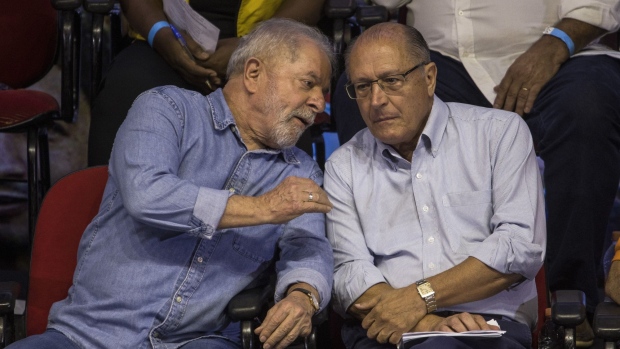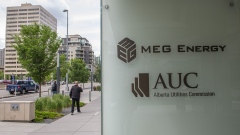Jun 8, 2022
Brazil Bankers Cringe at Both Choices in October Election
, Bloomberg News

(Bloomberg) -- For the first time in decades, Brazilian bankers are coming into an election divided and without a viable candidate to call their own.
In private conversations, some of the nation’s top bank executives and shareholders express a mix of resignation and frustration with the October vote, which is shaping up to be a race between leftist former President Luiz Inacio Lula da Silva and right-wing incumbent Jair Bolsonaro. Some plan an “anyone but him” vote, while others say they’ll just annul their ballots altogether.
The men are known quantities for markets. Lula was feared ahead of his 2002 election, but went on to oversee a massive, commodity-fueled rally and strong growth during his eight years in office. The shine wore off amid what bankers considered overspending by his Workers’ Party and a corruption scandal that jailed some of the nation’s top executives, including Lula himself.
Bolsonaro, on the other hand, was backed by the financial community ahead of his 2018 win. But promises of major reforms and privatizations fell short, bankers say, and his stances on the environment and handling of the pandemic tarnished Brazil’s reputation abroad. His criticism of the electronic voting system the country has relied on for a quarter-century is seen by some as an attack on democracy.
That’s left the two men, who together account for about 90% of voter support in early surveys, on more or less even ground for bankers. Polls that in past elections sent the currency sinking or soaring have so far failed to move the needle. The relative calm, top bankers say, shows it’s unlikely Brazil is in for a drastic turnaround. Besides, Congress and the courts would play a moderating role for any leader that got too radical, said several of the bankers interviewed for this article, who asked not to be identified discussing sensitive political matters.
“When it comes down to it, neither Lula or Bolsonaro present great risks,” Christopher Garman, a managing director at political consultancy Eurasia Group, said in an interview.
NY Gala
Some are still hoping for a different result. Campaigning for a moderate alternative was in full swing as financiers met at the Glasshouse in New York for the Person of the Year Awards Gala Dinner in early May, promoted by the Brazilian-American Chamber of Commerce.
But with four months to go until the election, none of the dozen or so other candidates has gained ground with voters, failing to poll above 5% in surveys. Several of the best-known names, including ex-Sao Paulo Governor Joao Doria and former Carwash judge Sergio Moro, have dropped out.
Senator Simone Tebet, who had the support of some of the bankers at the May gala dinner, is still standing. Teresa Bracher, the wife of former Itau Unibanco Holding SA Chief Executive Officer Candido Bracher, held a dinner for the presidential hopeful in April. Marisa Moreira Salles, the wife of Pedro Moreira Salles, who together with Bracher sits on the bank’s board, were among the attendees along with Fabio Barbosa, the former CEO of Banco Santander SA’s Brazil unit. The group even sent a declaration of support for Tebet to the press.
But Tebet had just 2% of voter support in the latest Datafolha survey. Luiz Felipe D’Avila, whom others said they would back, didn’t even register in the poll.
“Tebet could fill the role of market favorite, but her chances are very slim,” Garman at Eurasia Group said. While her support could reach closer to 10%, it’s unlikely she could make it to a runoff, he said.
So unlike in the past -- from Fernando Collor in 1989 to Aecio Neves in 2014 and Bolsonaro in 2018 -- this time around, the country’s financial elite will probably be voting for the candidate they consider the least bad.
Pros and Cons
One of Brazil’s most influential bank owners explained that, with both men unlikely to generate surprises, decisions come down to priorities. He sees Bolsonaro having a better economic program, one that’s probably still led by Economy Minister Paulo Guedes and pushes the same market-friendly ideas: slimming down the size of the state with privatizations and reforms.
Brazil Kicks Off $7.4 Billion Eletrobras Privatization
But the president’s environmental and diversity policies lost him the support of many finance executives. His handling of the pandemic and fiery rhetoric don’t help either, though some of the bankers downplay the possibility he would refuse to accept an election loss.
Lula, on the other hand, is seen as having a better social and environmental agenda, with more protection for the Amazon rainforest. But his economic plans are a mystery: He’s declined most invitations to speak with Brazil’s financial elite, at least in public, sending a half-dozen emissaries to represent him, including former Banco Fator SA CEO Gabriel Galipolo, Workers’ Party economist Guilherme Mello and congressman Alexandre Padilha.
Lula Says He Will Talk Directly to Investors on His Own Terms
In interviews with local radio, Lula has railed against privatizations, 2016 labor reforms and a rule that limits the growth of public spending. While that’s not earning him praise in financial circles, some of the nation’s top bankers believe the former union leader won’t do anything too drastic. They’ve lived through eight years of Lula, they say, and know who they’re dealing with.
Private meetings
That’s been Lula’s message in the few private meetings he did attend. In February, he was at a dinner with guests including Banco Bradesco SA board member and former CEO Luiz Trabuco, people familiar with the matter said. Last year, he also went to the house of Banco BTG Pactual SA partner Nelson Jobim. And he met with Guilherme Benchimol, owner of XP Inc., the biggest brokerage firm in Brazil.
Lula Seeks Growth With Fiscal Responsibility, Economic Aide Says
In those gatherings, Lula assured financiers there would be no rupture of the nation’s institutions and asked their suggestions for who would make a good economy chief, signaling that he would pick someone who could negotiate with the notoriously fragmented Congress. Of the candidates on the table, former ministers Aloizio Mercadante and Guido Mantega were cited by bankers as especially bad choices because they’re seen as too interventionist.
Former central banker and BTG partner Persio Arida, who met with Mercadante but denied he’s working with Lula, would be a dream choice, they say. It would be another step toward moderation, like picking Geraldo Alckmin as his running mate -- a move that, to some, was similar to Guedes’s endorsement of Bolsonaro in 2018, which earned the firebrand candidate the backing of markets.
Lula Picks Centrist Running Mate as Allies Charm Brazil’s Elite
“There isn’t really a myriad of different solutions ahead,” JPMorgan Chase & Co. analysts led by Emy Shayo wrote in a report last month. “At the end of the day, the difference between A and B in terms of macro management is probably narrower than what is broadcast.”
©2022 Bloomberg L.P.








